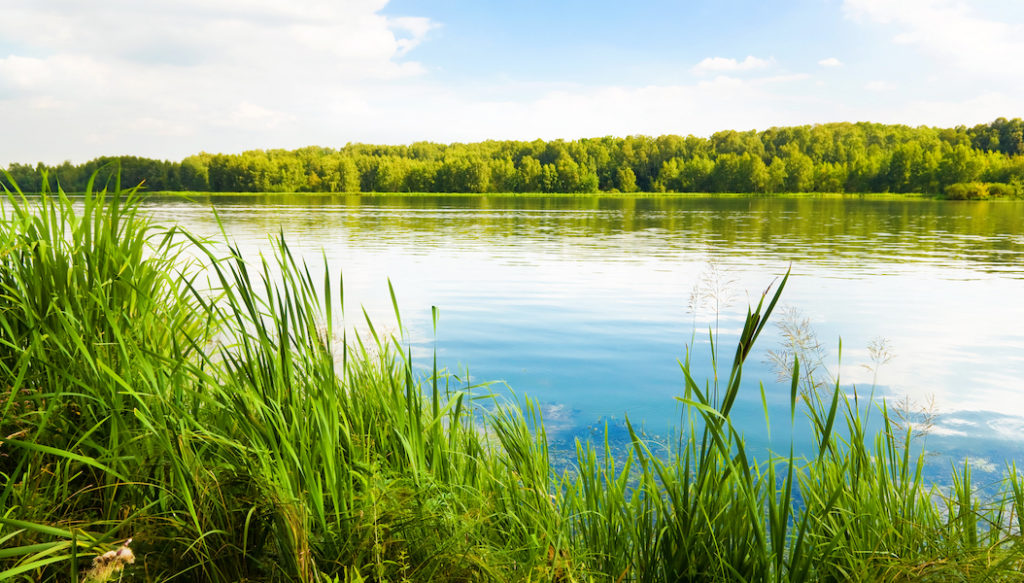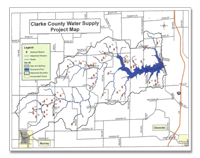Over the last several months, the Clarke County Reservoir Commission (CCRC) has taken several additional actions in implementing a new water supply reservoir. The Commission entered into an agreement with the USDA Natural Resources Conservation Service (NRCS) that could lead to significant federal funding for construction, took title to the last parcel of land necessary to build the new lake, and completed the last residential and business relocation the project requires. Each step is critical to project completion.

The planned dam site, located about four miles northwest of Osceola on Squaw Creek, was identified as part of a planning process in 2011 through the Watershed Protection and Flood Prevention program administered by NRCS. As that plan was completed, Congress stopped appropriating money to that program, and NRCS was forced to withdraw technical and financial assistance for the project. At that time, the CCRC determined to move forward with building the project with local support and, hopefully, funding from other state and federal sources. Since then, the Commission has acquired title and permanent easements to almost 3,000 acres of land to build the dam, water reservoir, and required water quality buffer areas around the lake.
Approximately two years ago, Congress appropriated significant funding again to the NRCS watershed program. During 2019, the CCRC initiated discussions with NRCS in Iowa about funding the project using the plan the Commission updated in 2013 from the 2011 NRCS plan. The agency determined that the plan would need to be “updated” because it was more than five years old. The Commission applied for a planning grant from NRCS to cover about 78% of the costs of the plan update. This application was approved and an agreement signed in April 2021. The CCRC then signed a contract with HDR, their engineering firm, to complete the plan update according to NRCS requirements. The updated plan will be completed by December 2022.
Following the successful completion of the plan update, CCRC will be eligible for financial assistance from NRCS to complete final dam design, and then construction. According to the NRCS watershed program manual, public water supply can be cost-shared “up to” 75% of construction costs.
“While the plan update with NRCS is ongoing, we are also exploring other funding options,” said Ty Wheeler, Chair of the CCRC. “The infrastructure bill currently pending in Congress may have additional opportunities the Commission could use to reduce the local cost of the project. We will just have to see what is eventually passed by Congress and signed by the President.”
In the meantime, the Commission closed on the final land purchase on June 30. About 178 acres were purchased from Tom and Dena Hofbauer.
“This was a critical land purchase for the project,” said Dave Beck, Project Coordinator. “About 76 acres of the permanent pool of the lake will be located on this tract of land, as well as 100 acres of the required buffer area. We are glad we could reach an agreement on this purchase with the Hofbauers.”
The Commission reached another significant milestone in September, when the business relocation of John Snyder was completed. About 77 acres was purchased from John and Pat Snyder in July 2018. At that time, CCRC agreed to rent the property and residence back to the Snyder’s. This agreement, as extended, terminated in September 2021. The Commission recently took possession of the property and released relocation funds that had been retained.
“John and his family did a good job of meeting the requirements of the residence and business relocation,” said Beck. “Moving is never easy. Moving a farm operation is extra challenging. They did a good job.”
As CCRC works with HDR and NRCS on the project plan update, they continue to move forward in project implementation.
“Since 2018, we’ve converted over 330 acres of cropland to mixed prairie grasses and forbs (flowers),“ said Beck. “This is land that is located within the required buffer area, and must be in permanent vegetation. As anyone who has done similar work for CRP (Conservation Reserve Program) on their farm knows, this process can take two or three years, depending on growing conditions.”
The prairie plants will provide valuable habitat for wildlife and pollinators, as well as water quality protection for the new water supply.
Additional ongoing work for the project includes property fence construction and removal of buildings on land purchased for the project.
“There are lots of parts to a big complex project like this,” said Wheeler. “We have to coordinate budgets, various regulatory requirements, and even weather to take care of a thousand details. Each part is a step forward towards the ultimate goal of a new public water supply for the people of Osceola, Clarke County, and Southern Iowa.”

